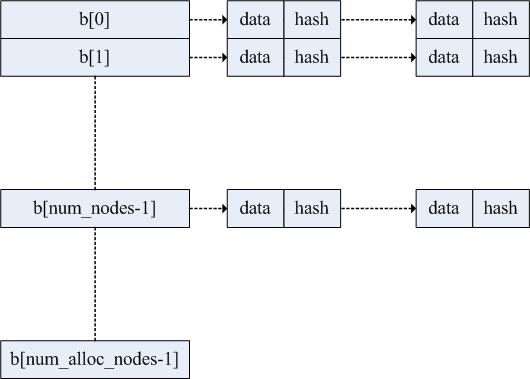[转] (4) OpenSSL 之哈希表
发布时间:2010-4-4 12:22
分类名称:OpenSSL
哈希表
在一般的数据结构如线性表和树中,记录在结构中的相对位置是与记录的关键字之间不存在确定的关系,在结构中查找记录时需进行一系列的关键字比较。这一类查找方法建立在“比较”的基础上,查找的效率与比较次数密切相关。理想的情况是能直接找到需要的记录,因此必须在记录的存储位置和它的关键字之间建立确定的对应关系,使每个关键字和结构中一个唯一的存储位置相对应。在查找时,只需根据这个对应关系找到给定值。这种对应关系既是哈希函数,按这个思想建立的表为哈希表。
哈希表存在冲突现象:不同的关键字可能得到同一哈希地址。在建造哈希表时不仅要设定一个好的哈希函数,而且要设定一种处理冲突的方法。
哈希表数据结构
openssl函数使用哈希表来加快查询操作,并能存放任意形式的数据,比如配置文件的读取、内存分配中被分配内存的信息等。其源码在crypto/lhash目录下。
openssl中的哈希表数据结构在lhash.h中定义如下:
typedef struct lhash_node_st
{
void *data;
struct lhash_node_st *next;
#ifndef OPENSSL_NO_HASH_COMP
unsigned long hash;
#endif
} LHASH_NODE;
本结构是一个单链表。其中,data用于存放数据地址,next为下一个数据地址,hash为数据哈希计算值。
typedef struct lhash_st
{
LHASH_NODE **b;
LHASH_COMP_FN_TYPE comp;
LHASH_HASH_FN_TYPE hash;
unsigned int num_nodes;
unsigned int num_alloc_nodes;
unsigned int p;
unsigned int pmax;
unsigned long up_load; /* load times 256 */
unsigned long down_load; /* load times 256 */
unsigned long num_items;
unsigned long num_expands;
unsigned long num_expand_reallocs;
unsigned long num_contracts;
unsigned long num_contract_reallocs;
unsigned long num_hash_calls;
unsigned long num_comp_calls;
unsigned long num_insert;
unsigned long num_replace;
unsigned long num_delete;
unsigned long num_no_delete;
unsigned long num_retrieve;
unsigned long num_retrieve_miss;
unsigned long num_hash_comps;
int error;
} LHASH;
其中,b指针数组用于存放所有的数据,数组中的每一个值为数据链表的头指针;comp用于存放数据比较函数地址;hash用于存放计算哈希值函数的地址;num_nodes为链表个数;num_alloc_nodes为b分配空间的大小。
基本的结构如下示图:

函数说明
1) LHASH *lh_new(LHASH_HASH_FN_TYPE h, LHASH_COMP_FN_TYPE c)
功能:生成哈希表
源文件:lhash.c
说明:输入参数h为哈希函数,c为比较函数。这两个函数都是回调函数。 因为哈希表用于存放任意的数据结构,哈希表存放、查询、删除等操作都需要比较数据和进行哈希运算,而哈希表不知道用户数据如何进行比较,也不知道用户数据结构中需要对哪些关键项进行散列运算。所以,用户必须提供这两个回调函数。
2) void *lh_delete(LHASH *lh, const void *data)
源文件:lhash.c
功能:删除散列表中的一个数据
说明:data为数据结构指针。
3) void lh_doall(LHASH *lh, LHASH_DOALL_FN_TYPE func)
源文件:lhash.c
功能:处理哈希表中的所有数据
说明:func为外部提供的回调函数,本函数遍历所有存储在哈希表中的数据,每个数据被func处理。
4) void lh_doall_arg(LHASH *lh, LHASH_DOALL_ARG_FN_TYPE func, void *arg)
源文件:lhash.c
功能:处理哈希表中所有数据
说明:此参数类似于lh_doall 函数,func为外部提供的回调函数,arg为传递给func函数的参数。本函数遍历所有存储在哈希表中的数据,每个数据被func处理。
5) void lh_free(LHASH *lh)
源文件:lhash.c
功能:释放哈希表。
6) void *lh_insert(LHASH *lh, void *data)
源文件:lhash.c
功能:往哈希表中添加数据。
说明:data为需要添加数据结构的指针地址。
7) void *lh_retrieve(LHASH *lh, const void *data)
源文件:lhash.c
功能:查询数据。
说明:从哈希表中查询数据,data为数据结构地址,此数据结构中必须提供关键项(这些关键项对应于用户提供的哈希函数和比较函数)以供查询,如果查询成功,返回数据结构的地址,否则返回NULL。比如SSL握手中服务端查询以前存储的SESSION时,它需要提供其中关键的几项:
SSL_SESSION *ret=NULL,data;
data.ssl_version=s->version;
data.session_id_length=len;
memcpy(data.session_id,session_id,len);
ret=(SSL_SESSION *)lh_retrieve(s->ctx->sessions,&data);
8) void lh_node_stats_bio(const LHASH *lh, BIO *out)
源文件:lh_stats.c
功能:将哈希表中每个链表下的数据状态输出到BIO中。
9) void lh_node_stats(const LHASH *lh, FILE *fp)
源文件:lh_stats.c
功能:将哈希表中每个链表下数据到个数输出到FILE中。
说明:此函数调用了lh_node_stats_bio函数。
10)void lh_node_usage_stats_bio(const LHASH *lh, BIO *out)
源文件:lh_stats.c
功能:将哈希表的使用状态输出到BIO中。
11) void lh_node_usage_stats(const LHASH *lh, FILE *fp)
源文件:lh_stats.c
功能:将哈希表的使用状态输出到FILE中
说明:此函数调用了lh_node_usage_stats_bio函数
12)unsigned long lh_num_items(const LHASH *lh)
源文件:lhash.c
功能:获取哈希表中元素的个数。
13)void lh_stats_bio(const LHASH *lh, BIO *out)
源文件:lh_stats.c
功能:输出哈希表统计信息到BIO中
14)void lh_stats(const LHASH *lh, FILE *fp)
源文件:lh_stats.c
功能:打印哈希表的统计信息,此函数调用了lh_stats_bio。
15)unsigned long lh_strhash(const char *c)
源文件:lhash.c
编程示例
#include <string.h>
#include <openssl/lhash.h>
typedef struct Student_st
{
char name[20];
int age;
char otherInfo[200];
}Student;
static int Student_cmp(const void *a, const void *b)
{
char *namea=((Student *)a)->name;
char *nameb=((Student *)b)->name;
return strcmp(namea,nameb);
}
/* 打印每个值*/
static void PrintValue(Student *a)
{
printf("name :%s\n",a->name);
printf("age :%d\n",a->age);
printf("otherInfo : %s\n",a->otherInfo);
}
static void PrintValue_arg(Student *a,void *b)
{
int flag=0;
flag=*(int *)b;
printf("用户输入参数为:%d\n",flag);
printf("name :%s\n",a->name);
printf("age :%d\n",a->age);
printf("otherInfo : %s\n",a->otherInfo);
}
int main()
{
int flag=11;
LHASH *h;
Student s1={"zcp",28,"hu bei"},
s2={"forxy",28,"no info"},
s3={"skp",24,"student"},
s4={"zhao_zcp",28,"zcp's name"},
*s5;
void *data;
h=lh_new(NULL,Student_cmp);
{
printf("err.\n");
return -1;
}
data=&s1;
lh_insert(h,data);
data=&s2;
lh_insert(h,data);
data=&s3;
lh_insert(h,data);
data=&s4;
lh_insert(h,data);
/* 打印*/
lh_doall(h,PrintValue);
lh_doall_arg(h,PrintValue_arg,(void *)(&flag));
data=lh_retrieve(h,(const void*)"skp");
{
printf("can not look up skp!\n");
lh_free(h);
return -1;
}
s5=data;
printf("student name : %s\n",s5->name);
printf("sutdent age : %d\n",s5->age);
printf("student otherinfo : %s\n",s5->otherInfo);
lh_free(h);
getchar();
return 0;
}
